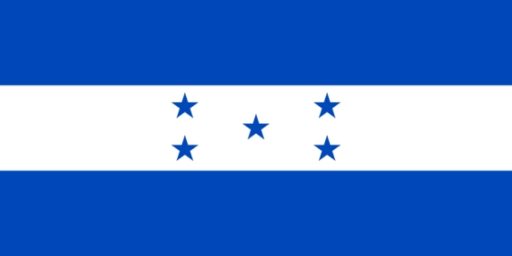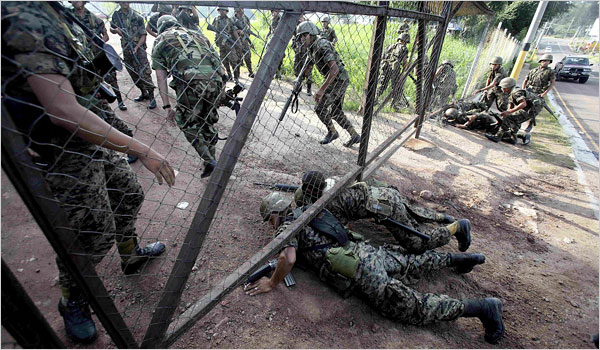More on the Honduran Crisis
I was able to find the exact text of the plebiscite that Manuel “Mel” Zelaya wanted to proffer to the citizens of Honduras this past Sunday. The text and a photo of the ballot that was to be used can be found here.
The odd thing, and a fact that hasn’t made it into a lot of press accounts or snap judgments about the situation, is that the language in question is not about re-election, but rather would have asked whether or not the public wanted to have a referendum in November about whether or not to call a constitutional convention to write a new constitution. As such, it is unclear to me at the moment why the accusation was that Zelaya was seeking immediate re-election, as even if his plebiscite had been approved, I cannot see how it would have led to be him being on the ballot in November (which is when the next presidential term, which starts in January, is set to be filled). I will continue to research that issue.
More discussion at the link above.






Is it true that the ballots were all being supplied by Chavez since the Honduran government refused to print them? Should this matter?
I do not know who printed the ballots. I do know that Zelaya had help from people from Nicaragua and Venezuela.
Does it matter? Perhaps. But if the plebiscite had been declared legal and Venezuelans had printed the ballot, would it have mattered then?
Steven does it matter the Honduran constitution says all plebiscites must origninate in the legislature? Or does constitutional law not apply here?
Zelsdorf,
*Sigh*–I have written extensively on this topic and have never, ever, ever, ever, ever defended Zelaya’s actions. I have repeatedly stated legal action against him was warranted. My main point has been, and remains, that the Supreme Court and congress overstepped their own constitutional authority in arresting, exiling and deposing an elected president. I honestly do not know why pointing out that a democratic government ought to pursue due process is somehow construed as defending Zelaya’s actions.
One of the points of the above post is to point out that a lot of people are forming opinions based on incomplete (if not incorrect) information.
I did not know you were an expert in Honduran constitutional law. Seems to me the ultimate authority concerning what is legal and what is not legal in Honduras would be the Supreme Court of Honduras. Seems they deemed they had a situation that call for the actions they took. That really does not concern outsiders. In many countries Mel would have been executed.
Institutions which act illegally quite frequently declare their actions legal and hope that nobody notices.
Steven, read what John Fund has to say about the situation. Other than that. Sounds like your are setting yourself up to be the arbiter of all things legal in Honduras. Your time might be better spent researching the legality of the actions recently taken by the Obama administration. What article of the Constitution gives the executive the power to buy GM? Cap energy or institute government health care?
No, I am trying to understand a complex situation rather than going off on half-formed opinions based on incomplete information.
And you keep making claims about expertise and then try to make appeals to authority (John Fund? Really?).
And it seems to me that you have had no problem making any number of declarations here and at my blog on this subject.
I am not sure the specific laws or procedure that the Supreme Court and Congress broke. Some of what the President did in defying laws, Congress and the Supreme has been pointed.
I e-mail an associate living in Honduras and he seems to be in agreement with me. Yes I know it could be the birds of the feather deal but at least he is an in-country person. He said “I don’t think they will let him back into power, no matter what any other country says or doesâ€. I’m waiting to see if there is more to the story but no one has out forth much of a case for the ex President. From I heard so far I’m siding against the president for now.
It’s a media misinterpretation, but the basic point is correct – Zelaya wanted to be able to seek re-election (and probably strengthen the Presidential powers while he was at it), so he illegally sought a referendum that would be a political tool for getting to that.
What seems to be unlearned here is what the Honduran constitution says about inciting or in any way trying to extend the term of the President of the Republic. Such an attempt will result in the loss of Honduran citizenship. It is the law Steven. I guess sometimes it is important to understanding the law before citing it.
Zelsdorf,
I am going to try one more time.
1) Yes, I am aware of the article in question–I translated and discussed it on Sunday. See here.
2) Just because a person has acted in a way that appears to contravene the law, that doesn’t mean that in a democracy that summary judgment and immediate punishment is legitimate (THIS IS THE MAIN POINT). Even if Zelaya contravened article 42, some sort of due process was needed.
3) As the post to which these comments are appended, the plebiscite in question did not advocate re-election. Zelaya may have in other contexts, but one cannot look at the plebiscite itself and attempt to apply article 42. Read the post linked above.
4) One more time: I am not defending Zelaya. I am pointing out that the Supreme Court had no constitutional power to arrest, exile and replace the president. This shouldn’t be as difficult to understand as it appears to be.
5) Why is it so difficult to comprehend that one can be critical of BOTH Zelaya and the way the Honduran Supreme Court and Congress?
Dr. Taylor, I appreciate what you are doing. I also appreciate that the powers that be in Honduras are afraid that President Zelaya was trying to turn Honduras into what Venezuela and Ecuador have become in sort of a one man, one vote, one time sort of way.
Here’s an IBD Editorial that captures the essence of what I perceive the problem to be. It is difficult to separate the Honduran legal issues from the actions of the external players (Chavez, Castro, Obama, Fernandez, Correa) who seem a little too anxious to force the issue, IMHO. Again, it is an interesting contrast that Iran’s problems are for Iran to work out with a little belated verbal chastisement from the world, but Honduras’ problems have become a cause celebre for leftists around the world. Maybe I shouldn’t concentrate on this, but it is kind of hard not to.
Steve I thought Alpha in your link comment section stated it pretty well. Beside and I know this is technicality but is relevant, the Supreme Court didn’t arrest, exile and replace the president. They stated that he violate many laws which no one seem to deny and handed down verdicts. It was the military that did the actual arrest and exile. It was Congress going by what the Constitution said that replaced him. You have two branches of government overturning the third branch. Not unusual. If they allowed the illegal vote to overturn the constitution, the President could claim victory regardless of the outcome, declare martial law since the Constitution was voted out (illegally does not matter since he hasn’t been following the laws pass by congress or court orders anyway), and remain President\dictator.
The US and Honduran Constitution isn’t exactly the same but are similar. Imagine a US president placing Cabinet Officers (court judges, Generals, etc) in place without consent from the Senate. Try to have an illegal vote to establish if people want to vote on throwing out the Constitution. The second vote in itself even if the first vote was legal would be illegal. If our President defying Supreme Court orders with Congress agreeing with those court orders then ordering the military to conduct illegal actions defying the Supreme Court orders and Congress and firing those who won’t follow them. Would we tolerate that? I hope not. Is our process more define? Yes but that doesn’t mean the Honduran Government was wrong. Also if our President went nuts and try to lunch a nuclear attack for no reason, I hope there would be enough sane people around to stop him even if technically he has the power. Now if he has legit reason that is different.
Steven,
What is the due process that should have been followed? Absent a due process written into law, what precisely should have been done?
If there was no good system in place for the removal of a president, you make a good case for adding one. But if there isn’t, it seems to me that is the problem rather than the actions of the military and supreme court. There really needs to be a process in place for this sort of thing.
Absent there being a process in place, I’m not sure what the appropriate response would be. The seeming consensus between the other three branches of government make me less worried about the “brute force” aspect than I would otherwise be. If our military decided that we had a president that was unworthy of the office and deposed him, I’d be pretty horrified. If our Supreme Court, military, and congress were all on board — and there were no established way to remove to the president for office — I would be more concerned about changing the constitution to prevent this from happening again (by adding a process) than I would be expressing outrage.
Again, this is all assuming that there is no removal process. If there is one, it definitely should have been followed.
What is the due process that should have been followed? Absent a due process written into law, what precisely should have been done?
Yes, the ONLY option was exile. It’s so obvious.
Let’s see: his term was to end in January and if the Court coudl order the military to oust the president, I suspect they could have ordered them to collect the ballot boxes or any number of other things.
This notion that the ONLY way to solve this is arrest, exile and replacement of an elected president is laughable.
Dude, no reason to snear.
From my perspective, the president tried to do something outside his authority to extend his grip on power. Not something that should be taken lightly. In return, the court and the military did something outside their authority. Also not something to be taken lightly. I guess I’m less inclined to be outraged at the latter because they stepped in and then stepped away leaving others (the legislature) to determine what happened next (who the next president would be). Had they said “We’re in charge until this is all sorted out” or even “This is the guy in charge now” (and that guy had strong ties to the military), I would be much more alarmed.
Instead, what appears to have happened (and if my perceptions are wrong, let me know), three branches of the government cooperated in the transition. That’s very far from ideal, but also a quite different thing (in my mind) from the military stepping in and assuming control for itself.
But the problem here is that the constitution (apparently) lacked provisions for removing the president. That is what needs to be changed. Then the military won’t have an opening to intervene again (unless they are determined to be a part of that process). It’s definitely not a good thing to have men with guns “winging it”, which is why rules need to be put in place. The system broke down. I find that far more scary than what happened, because what happened could have been a whole lot worse.
Snearing? Not my intent, although sarcasm clearly was.
I stand by the basic point, however.
I am with Trumwill on this. Steve seems more outrage by a possible small infraction of their Congress, Supreme Court and military than the large infractions by the former President.
Add on, Steve seem to say that the former President was wrong but no one should have done anything about since a process wasn’t already establish. I for one usually give an executive branch a good deal of leeway but this was out of bound.
I will confess to some frustration at the moment, but mostly because people want to argue, but not read what I have written. I never said that nothing should have happened to Zelaya.
And I find this formulation odd:
How is arresting and exiling an elected president a “small infraction”?
Beyond attempts to block his plans, what do you propose should have happened to him? I thought I remembered you saying that he should serve out his term and be replaced in January. Was there anything on top of that which I missed?
What they need is a mechanism for impeachment. Beyond that, he could be convicted of a crime and still not be constitutionally removed from office. Honduras was likely in for six more months of the president trying to break the law and the courts and military trying to stop him. That strikes me as problematic, not the least of which because they could fail.
I never said there was an easy route here, just better ones than early morning exiles.
The irony is that he may yet find himself back in the country and in jail facing charges, yet empowered in the justeyes of some in the public and in the international community because of the coup. These types of actions actions tend to have any number of unintended consequences and the situation is far from over. The coup has taken a president who was creating an constitutional crisis and made him the victim and it has weakened the legitimacy of congress, the Supreme Court and the military.
Whether he goes to jail or not is probably less important than whether or not he is the president of the nation.
We’ll see what comes of it. Could well be that they made a tactical error. It’s still not one I find outrageous.
I still think that most of the culpability falls not with the actions of those three bodies but with the failure of the constitution to give them a more legitimate avenue to attempt to remove a president from office.
It’s likely that the (apparent) unanimity between congress, the military, and the courts would have met whatever threshold might have existed.
When a Congress unanimously votes to remove the President from office isn’t that a de facto impeachment? Or is the position that since there was no impeachment process in the Constitution that therefore nothing Congress could have done would have been satisfactory? Apparently Zelaya’s popularity inside Honduras has plummeted since this fiasco began. If just about everyone in Honudras agrees that what was done was justified then I don’t understand how the legitimacy of the national institutions has been reduced. Unless you believe that governmental legtimacy comes from some place other than the governed?
If I understand properly what congress did was that it voted to accept Zelaya resignation after he had already been ousted. So no, that’s not the same thing as impeachment, it is instead an ex post facto action.
In regards to legitimacy, once your government has decided to do whatever it wants when it wants to, it damages its ability to claim legitimacy for itself.
Plus once you have removed an elected president by force, it becomes more likely that it will happen again.
“How is arresting and exiling an elected president a “small infraction”?â€
There was no procedure to remove him or not to remove him so they broke nothing.
“Plus once you have removed an elected president by force, it becomes more likely that it will happen again.â€
Again how else do you remove a President that defies the Courts, legislators and the Constitution?
There was no procedure to remove him or not to remove him so they broke nothing.
By that logic they could have shot him dead, as there is no prohibition against that, either.
If the U.S. President was impeached and remove from Office and order by the court to leave the White House, wouldn’t force be justified or should he allow to continue?
If the U.S. President was impeached and remove from Office and order by the court to leave the White House, wouldn’t force be justified or should he allow to continue?
Yes, but for a president to be impeached there is a multi-step, transparent process in which formal charges are filed and a trial held to determine if he should be removed.
It wouldn’t be done in secret with the order executed in the pre-dawn hours with a media blackout in place while he was forcibly exiled.